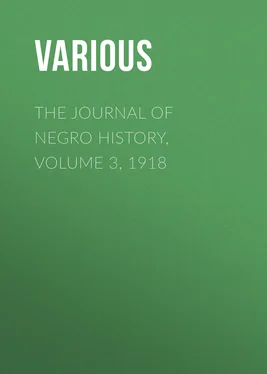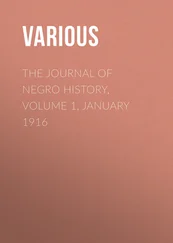Various - The Journal of Negro History, Volume 3, 1918
Здесь есть возможность читать онлайн «Various - The Journal of Negro History, Volume 3, 1918» — ознакомительный отрывок электронной книги совершенно бесплатно, а после прочтения отрывка купить полную версию. В некоторых случаях можно слушать аудио, скачать через торрент в формате fb2 и присутствует краткое содержание. Жанр: foreign_antique, periodic, История, foreign_edu, на английском языке. Описание произведения, (предисловие) а так же отзывы посетителей доступны на портале библиотеки ЛибКат.
- Название:The Journal of Negro History, Volume 3, 1918
- Автор:
- Жанр:
- Год:неизвестен
- ISBN:нет данных
- Рейтинг книги:5 / 5. Голосов: 1
-
Избранное:Добавить в избранное
- Отзывы:
-
Ваша оценка:
- 100
- 1
- 2
- 3
- 4
- 5
The Journal of Negro History, Volume 3, 1918: краткое содержание, описание и аннотация
Предлагаем к чтению аннотацию, описание, краткое содержание или предисловие (зависит от того, что написал сам автор книги «The Journal of Negro History, Volume 3, 1918»). Если вы не нашли необходимую информацию о книге — напишите в комментариях, мы постараемся отыскать её.
The Journal of Negro History, Volume 3, 1918 — читать онлайн ознакомительный отрывок
Ниже представлен текст книги, разбитый по страницам. Система сохранения места последней прочитанной страницы, позволяет с удобством читать онлайн бесплатно книгу «The Journal of Negro History, Volume 3, 1918», без необходимости каждый раз заново искать на чём Вы остановились. Поставьте закладку, и сможете в любой момент перейти на страницу, на которой закончили чтение.
Интервал:
Закладка:
Leaders at the national capital naturally hesitated, not knowing whether or not the admission of California under the conditions thus obtaining would aggravate or improve the national situation. California, however, cared little about the national situation, as is attested by the resolutions of 1850 to the effect: "That any attempts by congress to interfere with the institution of slavery in any of the territories of the United States would create just grounds of alarm in many of the States of the union; and that such interference is unnecessary, inexpedient, and in violation of good faith; since, when any such territory applies for admission into the union as a state, the people thereof alone have the right, and should be left free and unrestrained, to decide such question for themselves." Broderick moved the insertion of the following: "That opposition to the admission of a state into the union with a constitution prohibiting slavery, on account of such prohibition, is a policy wholly unjustifiable and unstatesmanlike, and in violation of that spirit of concession and compromise by which alone the federal constitution was adopted, and by which alone it can be perpetuated." This amendment was adopted. 31
After a debate of four months Congress admitted California as a free State as one of five compromises. Jefferson Davis, however, repudiated the idea of advantage to his section. He said: "Where is the concession to the South? Is it in the admission, as a state, of California, from which we have been excluded by congressional agitation? Is it in the announcement that slavery does not and is not to exist in the remaining territories of New Mexico and California? Is it in denying the title of Texas to one half of her territory?" He held that gold washing and mining was particularly adapted to slave labor, as was agriculture that depended on irrigation. 32The day after the admission certain southern senators sent to that body a Protest against the injustice of the act of Congress, admitting California as a free State. The Senate refused the clerk permission either to read or record it. Whereupon the newspapers began publishing articles of severe criticism and talked of dividing the Union. Jefferson Davis went before the United States Senate and, addressing it, called attention to these comments, adding that so much outside criticism was doing more to divide the Union than the Protest would possibly do. Congress finally voted that the Protest be recorded. 33
Was this to be a free State in every sense of the word? This was the day when the slave power "was covertly grasping at the Spanish-speaking countries beyond the Rio Grande, as it had at the lands beyond the Sabine." 34At first, it was not, for a good many slaves were brought into the State. On April 1, 1850, an advertisement appeared in the Jackson Mississippian referring to California, the Southern Slave Colony and inviting citizens of slave-holding States, wishing to go to California, to send their names, number of slaves, time of contemplated departure, etc., to the Southern Slave Colony , of Jackson, Mississippi. The design was to settle in the richest parts of the State and to secure an uninterrupted enjoyment of slave property. The colony was to comprise about 5,000 white persons and 10,000 slaves.
Another effort to extend slavery in this section came in the unsuccessful filibustering expedition of the Tennessee lawyer, William Walker, who undertook to establish to the south in Sonora, a State with a constitution like that of Louisiana, basing his advocacy of slavery on the lofty grounds of civilizing the blacks and liberating the whites from manual labor. To explain the meaning of this expedition Bancroft considers it sufficient to point out that Jefferson Davis was Secretary of War at that time and that the Gadsden purchase was then under consideration. 35In 1852 Peachy of San Joaquin introduced a resolution to allow fifty southern families to immigrate into California with their slaves. Some of them came without permission but on finding that they could not legally hold their slaves, they sent a part of them back while others became free.
In 1852 the Legislature passed a rigid Fugitive Slave Law intending to bar slavery from the State. The mischievous clause of this measure was that all slaves who had escaped into or were brought to California previous to the admission of the State to the Union were held to be fugitives, and were liable to arrest under the law, although many of them had been in the State several years, during which they had accumulated considerable property. The pro-slavery element not only profited by this, but the interpretation of this law by many of the Judges enabled them to bring their slaves into the State, work them in the mines, and return to the south and back to slavery with their Negroes. 36
If they did not wish the trouble of their return passage they auctioned them off to the highest bidder. It also enabled them to make fortunes by selling to the slaves their freedom, charging them twice and often thrice the price he could have possibly brought on the other side of the Rocky Mountains. 37In certain southern counties of the State it was unpopular to speak in behalf of the slaves. In 1855 Chase and Day, two Abolitionists of Alameda County, were ridden on a rail, ducked and otherwise maltreated. 38That same year expired the Fugitive Slave Law which had been renewed from year to year to enable slave-owners to reclaim fugitives who had sought refuge in that State prior to its admission to the Union. Fearing that this might be followed by other legislation hostile to their class, the Negroes held a convention in San Francisco that year to discuss their rights, their treatment by the white people, politics, principles and necessity of education. The Fugitive Slave Law was not reenacted.
Many slaves, however, asserted their rights. Such was the case of Archy, a slave brought by one Charles A. Stoval from Mississippi to California in 1857. After hiring Archy out for some time Stoval undertook to return him to Mississippi. Archy escaped and was arrested as a fugitive. Stoval sued out a writ of habeas corpus for his possession and the case came before the Supreme Court for adjudication. Peter Burnett, formerly Governor, who had been appointed justice of that court by Governor Johnson in 1857 and filled the office until 1858, presided. As Burnett was a southern man, his decision was foreshadowed. He decided that although Stoval could not sustain the character of either a transient traveler or a visitor and under the general law was not entitled to Archy, but he yet held that there were circumstances connected with the particular case that might exempt him from the operation of the rules laid down. One of the circumstances was that Stoval was traveling for his health; another, that he was short of means upon arrival in California; and still another, that this was the first case of the kind. He, therefore, ordered Archy to be turned over to Stoval. Joseph G. Baldwin, who succeeded Burnett, characterized the decision as "giving the law to the North and the Negro to the South." 39After being delivered to Stoval, Archy was taken to San Francisco, but his friends there sued out a writ of habeas corpus for his liberation before Judge Thomas W. Freelon, of the County of San Francisco. While this case was pending, however, Stoval swore to a new affidavit that Archy escaped from him in Mississippi and procured a warrant from George Pen Johnston, United States Commissioner, for his arrest as a fugitive slave from Mississippi. Archy was then discharged by Judge Freelon. He was immediately rearrested and taken before George Pen Johnston, who decided that Archy was in no sense a fugitive from Mississippi and discharged him. 40
The tendency to free the Negroes brought there checked the importation of that class. The rights of the master to his slave, however, were not easily relinquished and the institution of slavery in California did not come to an end until 1872. Freedom, however, had to win and the pro-slavery element had to change its policy. In 1856 and 1857 efforts were made to call a convention to change the constitution so as to permit the importation of slaves, for with the expiration of the Fugitive Slave Law in 1855, slave-owners who held minors had to return them to slave States or let them go free. Since the Negroes brought into the State could in most cases become free the pro-slavery party then sought to get rid of the free Negro.
Читать дальшеИнтервал:
Закладка:
Похожие книги на «The Journal of Negro History, Volume 3, 1918»
Представляем Вашему вниманию похожие книги на «The Journal of Negro History, Volume 3, 1918» списком для выбора. Мы отобрали схожую по названию и смыслу литературу в надежде предоставить читателям больше вариантов отыскать новые, интересные, ещё непрочитанные произведения.
Обсуждение, отзывы о книге «The Journal of Negro History, Volume 3, 1918» и просто собственные мнения читателей. Оставьте ваши комментарии, напишите, что Вы думаете о произведении, его смысле или главных героях. Укажите что конкретно понравилось, а что нет, и почему Вы так считаете.












